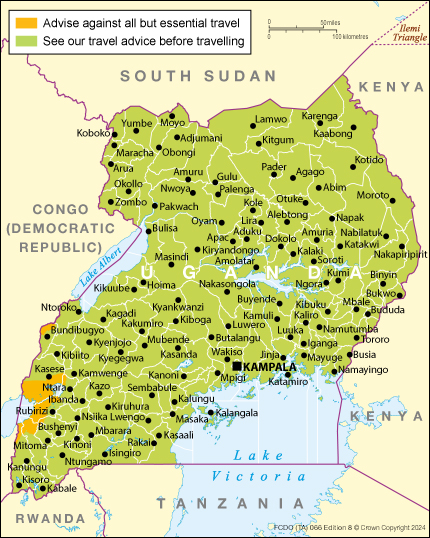Britain’s Foreign, Commonwealth and Development Office (FCDO) has updated its travel advisory, relaxing its advice on travelling to the southern part of the country. However, it still advises against all but essential travel to some areas in the western part of Uganda.
The security advice was first issued in October last year following a tragic attack by ‘unknown assailants’ in the Queen Elizabeth National Park in the Nyamunuka area, which saw two foreign tourists and their guide attacked and killed.
The updated FCDO advisory, published yesterday (June 26), notes that it no longer advises against all but essential travel to the southern sector of Kibale Forest National Park and Kibale Forest Corridor Game Reserve starting from the A109 entering the Park at Lake Nyabikere and exiting at Nkingo and extending to Lake George following the forest boundary.

However, the FCDO continues to advise against travel to these parts of Western Uganda:
- Queen Elizabeth National Park
- the area immediately south-west of Kasese town – from the border with the Democratic Republic of the Congo (DRC) at Kyabikere extending eastwards up to and including the A109 road and southwards to Queen Elizabeth National Park
- Semuliki National Park
The advisory also warns travellers to exercise extra caution near the borders with the Democratic Republic of the Congo and South Sudan. In DRC, FCDO advises against all travel to the provinces that border Uganda. In South Sudan, FCDO advises against all travel.
According to the FCDO. Uganda and the DRC conduct joint military action against the Allied Democratic Forces in North Kivu and Ituri provinces of eastern DRC, near parts of the Ugandan border. Ugandan troops are present on both sides of the border as part of the joint operations.
“This operation may affect the function of some border crossing points which could close at short notice. There is also a risk of banditry,” advises the FCDO.
According to the FCDO and the Ugandan police, there have been other terror attacks in the country over the last three years, including when the Uganda Police Force disrupted an attempted IED attack at Miracle Centre Cathedral in the Rubaga Division of Kampala on September 3.
‘Incidents do not reflect the overall safety standards’
The Uganda Tourism Board (UTB), however, reiterated recently that the unfortunate occurrences did not reflect the overall safety standards of the country’s tourism destination sites.
“Tourism remains a vital pillar of Uganda's economy, and we are fully committed to maintaining and improving the safety and security of our visitors. Queen Elizabeth National Park, in particular, is recognised for its breathtaking landscapes and diverse wildlife.
“All tourists are encouraged to continue visiting Uganda and its various attractions, including Queen Elizabeth National Park, while taking the necessary precautions and adhering to the guidance provided by authorities. Tourists should continue to enjoy their experiences in this beautiful park,” said Lilly Ajarova UTB CEO.
Meanwhile the FCDO advisory states that travellers need to ensure they have adequate travel insurance, noting that insurance should cover the itinerary, planned activities and expenses in an emergency.
Travellers’ insurance could be invalidated if they travel against the advice of the FCDO.






















